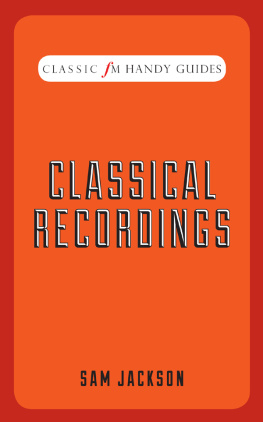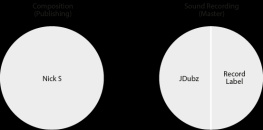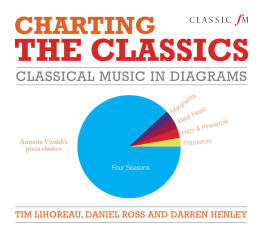Published by Hachette Digital
ISBN: 9780748131105
Copyright 2012 Naxos AudioBooks UK Ltd.
All rights reserved. No part of this publication may be reproduced, stored in a retrieval system, or transmitted, in any form or by any means, without the prior permission in writing of the publisher.
Hachette Digital
Little, Brown Book Group
100 Victoria Embankment
London, EC4Y 0DY
www.hachette.co.uk
Contents
When I look back over the past quarter of a century of the Naxos label and even further, to the start of Marco Polo in 1982 I am surprised at how much it all seemed to grow of its own accord. Although I certainly made plans, Naxos developed in unexpected ways, without rigidly following a grand business plan.
The label, with its primary purpose of providing good, new, digital recordings at a price everyone could afford, certainly emerged at the right time. But I know how much of its success was made possible by a few key individuals who believed in what I wanted to do, who were as convinced as I was that the classical recording industry needed to change. They were not establishment die-hards (or they would never have joined a classical music label created by a businessman based in Hong Kong!). And they were not all classical music enthusiasts: some actually knew very little about classical music at the start, though they learned quickly. They just had faith in what I was trying to achieve.
Naxos changed the culture and industry of classical music recording; there is no doubt about that. This book tells how it happened. It is clear, even from the Contents, that this story features a very varied group of men and women who put their talents and energy into a young company that was finding new ways of doing things. There were the fine musicians who would never have been given an international platform by the classical establishment yet proved time and again that outstanding performances can come from unexpected quarters. There were the capable producers and engineers working within the new digital fields; the knowledgeable writers and designers prepared to work to tight deadlines without compromising musicological standards.
Just as important were the distributors, who not only developed efficient networks but also devised fresh and sometimes extremely bold marketing campaigns to make Naxos the most highly visible classical label in the world. The different characters of these individuals were reflected in the way Naxos evolved in countries as far apart as the US, Germany, Japan, France, Korea and the UK. The labels underlying purpose was international, but there were often discernible national characteristics in what was released and how titles were promoted.
From the start I wanted Naxos, despite its budget price, to be at the forefront of technology, and I am particularly pleased that we remain there twenty-five years on, offering specialist classical web services that are simply unmatched by any other company.
The Story of Naxos recounts how the label became the single most identifiable classical music brand in the world: we were moving so quickly that only in retrospect has it become clear how we did it. It also confirms that with our breadth of artists and repertoire, and our sheer number of releases both popular and specialist, we are now the leading provider of classical recorded music: we have travelled far beyond being a budget label. It is a continuing journey. The environment of classical music and the recording world commercially and technologically is changing even more rapidly than in 1987, when the first Naxos CDs emerged. Nevertheless I am still as excited when I open a box of new Naxos releases in Hong Kong as I was when I began collecting classical records as a teenager in Frankfurt.
As a non-musician, I have been extremely fortunate to live my life inside music: to see my wife, Takako Nishizaki, recording the great violin concertos of the world and helping them to become worldwide bestsellers; to create a comprehensive classical catalogue with an extremely wide repertoire; and to build a company that has brought classical music to millions who otherwise may not have encountered it.
Klaus Heymann, 2012
I first encountered Klaus Heymanns record labels when I was classical editor of Music Week, the UKs leading trade magazine for the record industry, covering the main issues of the time and the new releases. I wrote about Marco Polo and then, when it arrived, Naxos, and I met Klaus himself. I also wrote for Gramophone and many national newspapers, and as a journalist I always enjoyed a good story, so I was intrigued by the controversy that soon surrounded these ventures of the German businessman from Hong Kong especially as he was being praised and heavily criticised in equal measure.
In fact, I can remember the first time we met: we were having a drink in a hotel bar in London. I had been warned by my friends in the majors that he was of dubious provenance, and I was rather pleasantly surprised to find not Mephistopheles which really was how he had been painted but a straightforward, no-nonsense businessman, who clearly knew his music and musicians extremely well. He was also acutely aware of the issues of the day. I think it must have been around 1990, when Naxos ended its Woolworths exclusivity.
We met fairly regularly after that, either at MIDEM (the music trade fair in Cannes, which I covered annually for various newspapers and journals) or in London. Klaus was always the source of interesting news, or had an angle I could pursue: despite living in Hong Kong he was very well informed.
In 1992 my sister, the clarinettist Victoria Soames, and I started Clarinet Classics; it was an independent label with a clear purpose. I knew various distributors, but I first approached Graham Haysom who had recently set up Select Music as a joint venture with Klaus to distribute Naxos in the UK, because I felt the company was going places. Shortly afterwards, at one of our meetings, Klaus suggested that Naxos could distribute Clarinet Classics worldwide, and with some exceptions we were happy to take him up on it.
On the evening of 23 January 1994, after the Naxos conference day at MIDEM Classique, Klaus hosted a supper at a Cannes hotel for all the Naxos distributors. I had attended the conference during the day, partly as a journalist and partly as a record-label owner. I sat next to Klaus at the meal, which he announced at the start would conclude at 11 p.m. German efficiency, I thought. At 10.50 p.m. I started to talk to him about my next venture: an audiobook label that would offer abridged versions of the great classics accompanied by classical music, making the likes of Homer and Dante easier to approach. Klaus listened attentively; at 10.56 p.m. he proposed a joint venture, specifying the number of releases in its first two years, the financial details, even the basic office set-up; we discussed it for four minutes and at 11 p.m. on the dot we agreed and shook hands. Klaus stood up, thanked everyone for coming, and left the room. I sat there, stunned, trying to take on board that my life had changed direction.
It is eighteen years since that day. The intervening time has seen Naxos AudioBooks win awards on both sides of the Atlantic and grow to become the leading spoken-word label for literary classics. This enterprise has been my primary focus, but I have always kept a close eye on the growth of Naxos itself after all, for two decades I had written about classical recording and then I found myself inside one of the most exciting classical record stories in the history of the industry. I saw expansion at a remarkable rate and I travelled to most of the Naxos offices. It wasnt all plain sailing: I saw Klaus right the ship time and time again when his enthusiasm and investment in new recordings had overtaken sensible cash flow. Month after month the new CD releases would come through to the Naxos AudioBooks office and each time I opened the boxes I was astounded by the diversity of music and musicians; here were not only the popular classics but composers I had never heard of and this was supposed to be a budget label.












